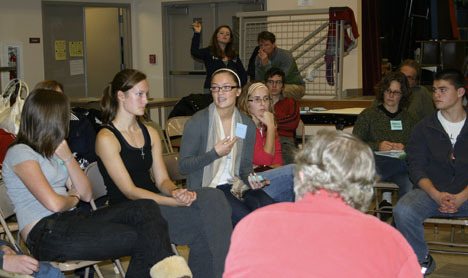Grinding, a nationwide dance style that many teens embrace and many parents find objectionable, will no longer take place at Vashon High School, school district administrators have announced.
Superintendent Michael Soltman and VHS principal Susan Hanson said they made the decision after parents met with them to express concerns about the popular dance form.
The dance, controversial because of the way boys rub their groins against the backsides of girls, is in violation of the high school’s student handbook, which forbids “sexually explicit” dancing, Hanson and Soltman said. It also could lead to a culture of coercion and harassment, they said.
“I have to be blunt. The issue to me is not dancing. The issue to me is a climate that provides a welcoming environment, where students don’t feel pressured,” said Hanson.
Since meeting with parents, she said, she’s heard of students who felt coerced to grind and uncomfortable with the dance form. “That’s wrong. That’s not an inclusive community. The point is to make a safe environment.”
The Islanders who led the effort to ban grinding — something parents have attempted in previous years — said they’re pleased and surprised by the school district’s quick response to their concerns. Marcy Summers, who played a lead role in the effort and is a mother of two teens, said she thinks a confluence of factors led to the administrators’ decision to tackle the issue head on, including the fact that she and other parents pointed out that the district could face legal exposure on the issue.
What’s more, dozens of parents have come out to meetings Summers and others organized after the issue was discussed in the opinion pages of The Beachcomber, she said.
“It’s a testament to the fact that this really is the right thing,” she said of the administration’s response. “There was just a clear and wide consensus that this is what was needed.”
Many students, however, appear concerned about how the decision was made. A petition has been circulating at the high school calling for the continuation of grinding. Class discussions have been given over to the topic, students said. And some say they’re going to try to get another meeting scheduled between parents and students to discuss what they see as a misguided attempt on parents’ part to protect them from something they consider harmless.
About 50 adults and 10 students gathered at a meeting at Chautauqua Elementary School Sunday — organized by Summers and other parents — to discuss how the district will proceed in creating a new dance culture at VHS. After the meeting, Emily Brown, a senior who represents the 2010 class in the ASB cabinet, said she’s unhappy about how the decision unfolded.
“I’d love for our opinions to be heard, and currently they’re not,” she said.
Grinding, with its huddle of students in the middle of the dance floor, “brings people together,” she added. “It’s our way of doing things. It’s our way of expressing ourselves.”
Eli Hoyt, a senior who was also at Sunday’s meeting, also complained that students have been shut out of the process. Sunday’s meeting, he said, “was one-sided and unfair. … There still should be room for students’ voices in this debate, because there hasn’t been and there needs to be.”
Hoyt quickly put together a six-question survey and distributed it during classes on Monday. More than 350 students responded, he said, with the vast majority of them saying they oppose the administration’s effort to ban grinding. Of the 359 who answered, 87 percent said they did not think the dance form was inappropriate or offensive, he reported.
“As far as I’ve heard, the general consensus among the students is that action needs to be taken (to keep grinding at the high school),” he said.
But both Hanson and Soltman said students need to understand that the issue isn’t simply that parents disapprove of the dance style.
“They need to understand that some kids feel coerced,” Soltman said. “This way of dancing is causing discomfort in the school climate, and we need to address that.”
Hanson, told of Hoyt’s survey results, said she realizes some will oppose the decision. What’s needed now, she said, is a respectful conversation among all parties as they determine what a post-grinding culture looks like at the high school.
“I think there will be people who welcome the change, and there will be people who are unhappy about the change. And the right to respectfully express their unhappiness is a constitutional guarantee,” she said. “And those people who are working for the change have to be equally respectful and understand that not everyone is going to welcome it.”
Across the country, parents and administrators have attempted to tackle the issue of grinding, with varying degrees of success. At Sunday’s meeting, Islanders broke up into three groups, where they discussed the kinds of music that will be played at high school dances, other activities that could be included in dances and the precise “dos and don’ts” of a non-grinding school dance.
Soltman told the group that on Vashon the district will find a way to create a new dance culture, one he hopes to have in place by the next dance, Tolo in January.
“There are many good reasons grinding has to stop at VHS, and it will stop,” he said. “Grinding is over.”



